
One item of universal agreement is the need for additional summits, the next to be held in late March or early April, to continue negotiations on a new blueprint for international finance. Considering that the original 1944 Bretton Woods conference, which set the dials for postwar global trade and financial activity, was two years and many preliminary planning sessions in the making, these are ominous tidings indeed. There can be absolutely no doubt that the globalist movers and shakers intend to take full advantage of the international financial and economic turmoil to bring international banking and other financial activities under international (read: UN) authority, and little doubt as to how the program is going to unfold.
The Washington summit, with its heads of state and other national and international dignitaries, may have attracted all the media attention, but the real action, for anyone who was paying close attention, was at the New York-based Council on Foreign Relations last Friday, when British Prime Minister Gordon Brown addressed a special session chaired by former Treasury Secretary Robert Rubin on the topic of the financial crisis. Brown, be it noted, has been shuttling back and forth across the Atlantic and among the countries of continental Europe over the past few weeks, lobbying for an ambitious new plan to globalize financial activity. Friday’s presentation at the CFR left little doubt what Brown (and, presumably, a very sympathetic globalist elite at the CFR and elsewhere) truly intends to accomplish with the negotiations that kicked off over the weekend.
Brown spoke of the "birth pangs of the new global order," and called for "cross border supervision" of financial activity "wherever it is necessary" as well as for "better surveillance of the world economy." Although Brown’s speech was light on specifics, he did offer a few tantalizing tidbits. "I have no doubt," he proclaimed, that "we’ll have an International Monetary Fund that looks more like an independent central bank." He also predicted that "we will reform the relationships between the Financial Stability Forum, the Bank of International Settlements, and international institutions." Brown expressed optimism that future negotiations would lead to a new world trade deal.
The call to transform the IMF into a central bank (presumably as the issuer of a truly global currency to replace the faltering dollar) is ominous, if one considers that such a step would give the UN system a means of printing its own money and financing its own expansion (much as central banks like the Federal Reserve do for the governments they represent). The Financial Stability Forum (FSF) mentioned by Brown is a relatively new organization, a sort of embryonic international banking regulatory authority formed in 1999 and housed at the Bank of International Settlements (BIS) in Basel. "Reforming the relationships" between the likes of the FSF, BIS, and the UN really means "confer new global financial regulatory authority where none now exists, and put it under the ultimate direction of the UN." As for a new global trade deal, Brown and many other internationalists intend to give the World Trade Organization (WTO) authority over international banking and finance.
In short, the Washington summit was little more than a friendly get-together to form working groups and generate eyewash for the masses (and faltering global markets). It’s a safe bet that all of the parties are in substantial agreement on the need for a global central bank, a new global currency beholden to no one national government or central bank, and a global financial regulatory body or bodies. The architecture created at the first Bretton Woods conference — the IMF, World Bank, and WTO (which replaced and "upgraded" the GATT agreement produced at Bretton Woods) — will likely be retained, with existing organizations retooled and given broad new powers.
The most radical proposal likely to emerge at future summits — once the public worldwide, and especially in the United States, has been sufficiently conditioned — is a new global currency, possibly only for use in international transactions, at least at first. A single world currency was a major unmet goal at Bretton Woods, with the dollar becoming the global money standard instead. With the dollar’s fall, political conditions now appear as favorable to the replacement of the U.S. dollar internationally as they have ever been.
— White House photo by Grant Miller



